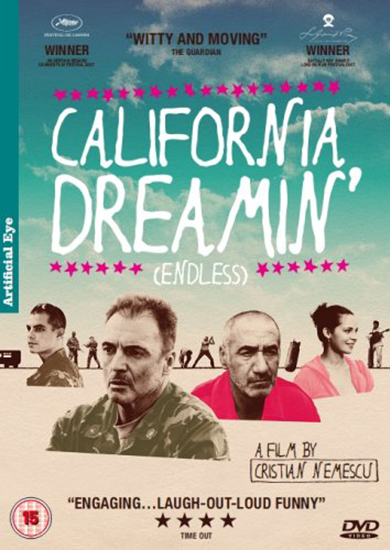California Dreamin'
Set in the summer of 1999, the film follows a NATO train crewed by US soldiers carrying ultra-important radar equipment for use in the Yugoslavia conflict. Approaching a remote Romanian village the local railway manager refuses to let the train proceed as the paperwork is incomplete. The soldiers are stranded and become the subject of a blend of comedy and darker tensions which reveal the corruption and bureaucracy that hangs over Romanian life while satirising American foreign policy.
Film Notes
As a result of tragic circumstances, the first film by writer-director Cristian Nemescu, is also his last. Nemescu and his editor were killed in a car crash three months into post-production. As a mark of respect, the producers have left the film exactly as it was and they have released the film in what is essentially an unfinished but highly impressive form. Set in the summer of 1999, California Dreams, follows a NATO train crewed by American soldiers and overseen by the gruff, no-nonsense, Captain Jones. Carrying ultra-important radar equipment for use in the conflict in Yugoslavia, not all the paperwork has been completed, meaning serious problems when the train approaches a remote Romanian hamlet. The railway manager, who runs the town thanks to his control of the black market, refuses to let the train through and the US soldiers find themselves stranded. The intelligent script gleefully rips into Romanian politics as well as the country's corruption and bureaucracy, and the black comedy reveals darker tensions in the town. Along with pot-shots at Romania, it's also a very pointed satire of American foreign policy, asking difficult questions about the US stirring up tension and causing havoc. It's a portrayal that's both comic and bleak, with a bitter heart behind its humour.
Channel 4 Film Review - 2007
What you thought about California Dreamin'
Film Responses
| Excellent | Good | Average | Poor | Very Poor |
|---|---|---|---|---|
| 11 (39%) | 12 (43%) | 4 (14%) | 1 (4%) | 0 (0%) |
|
Total Number of Responses: 28 Film Score (0-5): 4.18 |
||||
Collated Response Comments
We had a smaller audience for this film because of the wintry weather, but there was plenty of enjoyment and appreciation of it nonetheless. Several responses noted with pleasure the complexity of the narrative and character and the variety of motives. The film was seen as a cynical, witty and uncompromising view of the corruption and self-interest of contemporary Romanian politics, given shape and power by a series of excellent performances. The 'very assured' handling of location and cast was a major contributing factor, and there was appreciation of 'the light directional touch' which 'left the complexities of the situation to speak for themselves'. The interweaving of dark comedy with both local and international politics and the possibilities of a range of common misunderstandings, gave the film a firm structure, even though a number of responses felt it was too long. There was some unease, too, at the abruptness of the Second World War black and white sequences and how they contributed to the contemporary story. In general, while understanding why the film was shown in its present form, several of you felt it needed some critical editing. In summary, an enjoyable, thoughtful and intelligent film, seeing the dark, but comic, side of European and American domestic and foreign policy.



